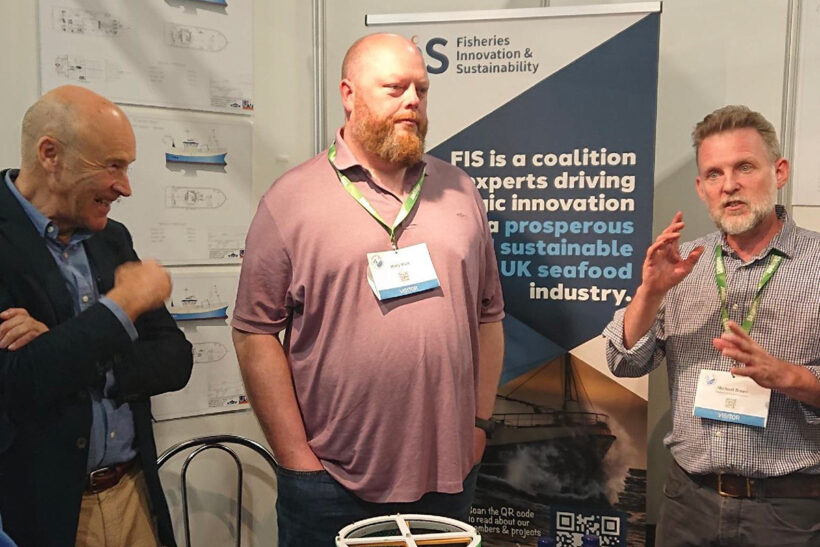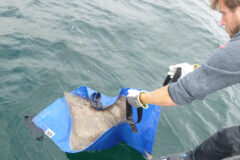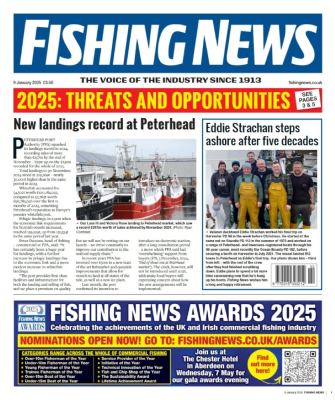The departing chair of Fisheries Innovation and Sustainability shares his thoughts on how the fishing industry has evolved – and how FIS is working to shepherd it into a new era of innovation and sustainability
By John Goodlad (pictured above, far left)
Since the day I set my first lobster creel as a 10-year0old growing up in the Shet;and fishing village of Hamnavoe, the industry has changed enormously. Boats have got bigger, and the fleets smaller. Industry bodies have professionalised. Competition for our seas is growing from interests like offshore wind and Highly Protected Marine Areas. Fishermen must also keep rising to the challenge of achieving sustainability.
Fisheries Innovation and Sustainability (FIS) was originally Fisheries Innovation Scotland when I came aboard, along with member organisations such as the Scottish Fishermen’s Federation, Young’s Seafood, Sainsbury’s and Marine Scotland. As the name suggests, the focus was on innovations in Scottish fisheries and the seafood sector. We set out to do this through capacity-building programmes, and research and development.
One of our flagship projects, Smartrawl, started in 2016. This was born out of the need for Scottish trawlers to fish more selectively in order to reduce unwanted catches, set against the background of the landing obligation. Essentially, Smartrawl is an in-water sorting device. A camera at the mouth of the net photographs everything that enters the net. Information on the size and species of fish are then transmitted using AI to a gate in the codend, where the fish are either released or retained depending on what the skipper wants to catch. Smartrawl had its global debut at COP28 in Dubai last year, when King Charles visited the Smartrawl exhibition.
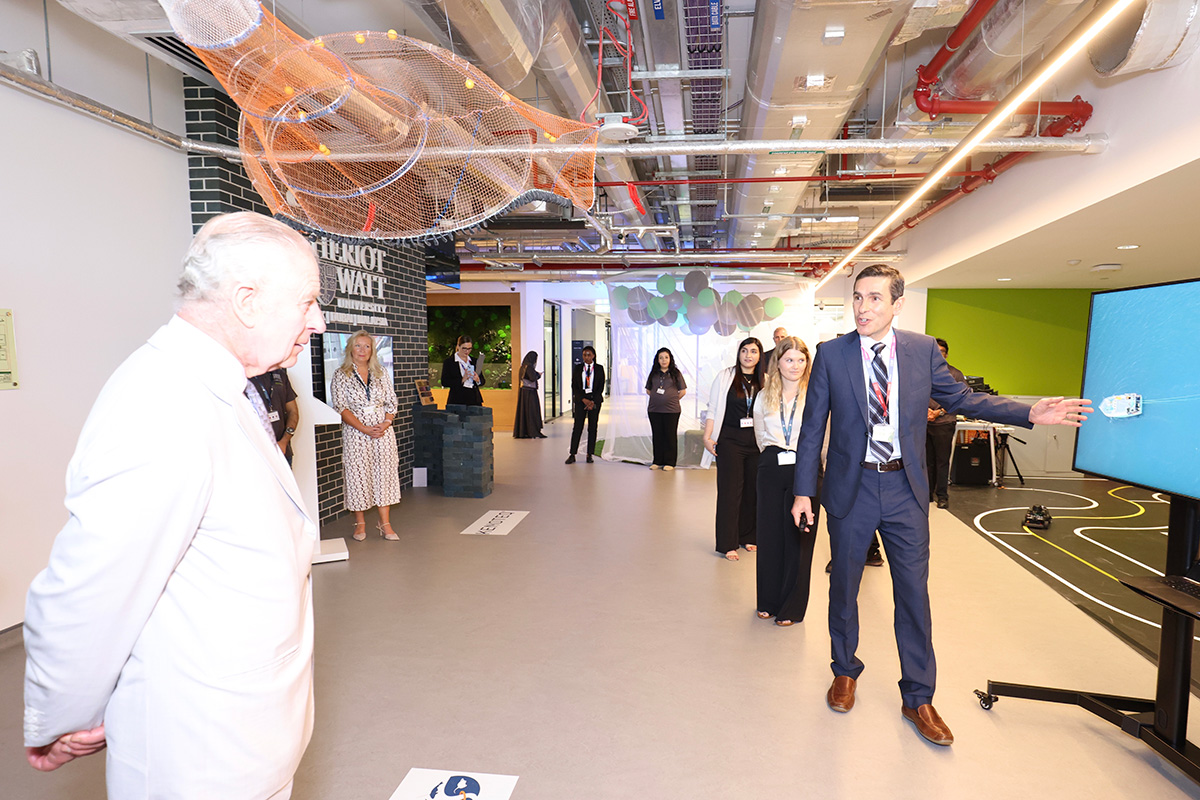
he king and AI: King Charles, who set up his own initiative to champion sustainable fishing in 2012, learns more about the Smartrawl during a visit to the UN Climate Change Conference in Dubai in 2023.
Smartrawl is now at a crucial phase, with commercial at-sea trials about to start. This is the next step on the long road to full market-readiness for this very promising and potentially transformative innovation. Unlike fishing, which day to day depends on quick decisions and actions – reacting to the weather, shooting the gear and hauling it – Smartrawl is an example of how innovation takes time. It takes patience from everyone involved.
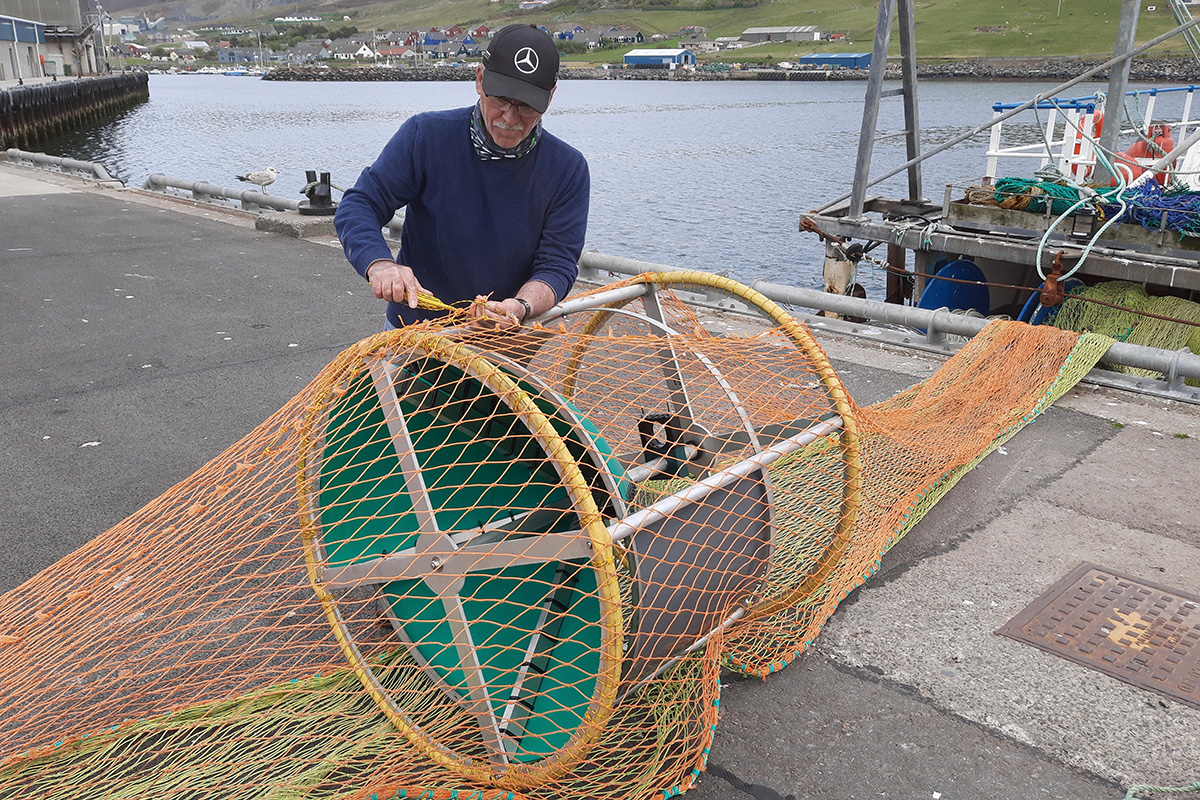
The codend section of the Smartrawl being fitted for trials aboard the Shetland research vessel Atlantia II.
Another project on a similar journey, though at an earlier stage, is the Nephrops prototype machine for tailing prawns currently being readied for trial in Northern Ireland – again with huge transformative potential for the industry and for how things are done at sea.
In 2023, FIS changed its name to Fisheries Innovation and Sustainability and expanded its remit to drive innovative projects throughout the entire supply chain, and for the whole of the UK.
When I started out at the Shetland Fishermen’s Association back in the 1980s, the objective for most fishermen was to go out and catch as much as possible. There was a lot of resistance in the 1990s when some NGOs began challenging the industry to become more sustainable. The fishing industry eventually rose to this challenge, and many UK fisheries are now MSC-certified.
The future success of FIS will to a large extent depend on collaboration, both within and beyond the industry. Net zero is an example of this. With targets for decarbonisation already enshrined in legislation in the UK and Scotland, the industry must focus now on how net zero might be achieved. Another of FIS’ foremost innovation projects, Vessels of the Future, is looking at this as part of a collaborative project involving fishermen, ship builders, engine manufacturers and regulators.
For smaller day-boats, decarbonising may be a relatively simpler case of shifting to electrification and hybrid. For larger boats, the path is far less clear, with clear trade-offs inherent in choices between options like hydrogen, methanol and liquefied natural gas in terms of cost, infrastructure needs, safety and length of fishing trips.
To address this practically, FIS is working with Macduff Ship Design. The global shipping company Maersk spoke at the FIS event in Fishmongers’ Hall on 10 December, 2024, where it was very open regarding its net-zero plans and happy to share its knowledge and experiences. That is the power of a forum like FIS: reaching out to an incredibly broad range of stakeholders who are willing to work towards a common purpose.
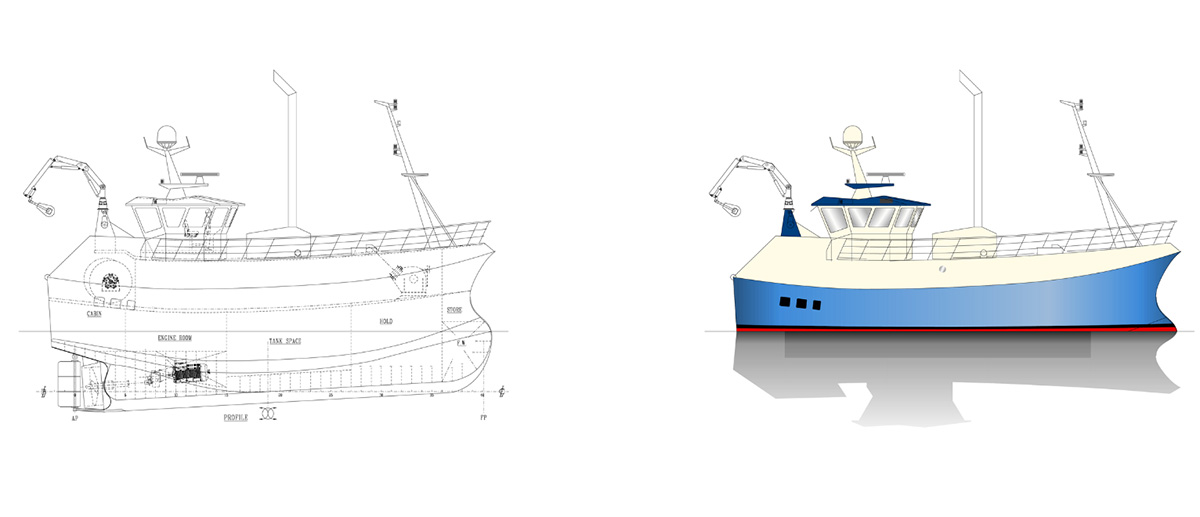
An outline design for a hydrogen-powered Nephrops trawler, developed by Macduff Ship Design as part of the FIS Vessels of the Future project.
Bringing new blood into the industry is another urgent challenge we have to face head-on. While I firmly believe fishing can still be a very attractive career for young people, there are all kinds of barriers to entry. The industry is already taking the initiative with, for example, the Cornish FPO’s facilitation of the Young Fishermen Network in South West England. But the scale and nature of the problem needs partnership with the supply chain and government. The Scottish and UK governments need to be innovative and even radical in their thinking to open up prospects for young fishers – and young would-be fishers.
Over its 10 years so far, FIS has continuously evolved as industry needs have changed. Full credit needs to be given to executive director Kara Brydson, the committed trustees and the hardworking stakeholder committee. One of the main challenges on the horizon for FIS will be the need to secure long- term funding outside the public sector, which is becoming ever more uncertain. Even so, I believe the best days of FIS lie ahead.
Would I go back and do it all again – representing the industry, working towards fisheries sustainability and chairing FIS? Without question. I’ve recently turned my hand to working on what will be my third book, Food from the Sea: The Future of Seafood, to be published later this year. This was sparked by the proposal by the Scottish government in 2023 – now scrapped – to close 10% of Scottish waters to all marine activity, including small-scale fishing. The book is a response to what seems to be a growing mindset that catching and farming fish is a problem. It’ll be a personal look at the global seafood industry, and its huge potential for feeding our ever-growing population. As far as I am concerned, providing sustainable seafood is part of the solution to many of our pressing problems today.
I am not blind to the challenges that the industry faces, and the need for change. If the fishing industry isn’t sustainable, it doesn’t deserve to succeed, and if it does not innovate, it will not succeed. If it does both, then I believe it has an incredibly bright future.
This story was taken from the latest issue of Fishing News. For more up-to-date and in-depth reports on the UK and Irish commercial fishing sector, subscribe to Fishing News here or buy the latest single issue for just £3.50 here.
Sign up to Fishing News’ FREE e-newsletter here.



